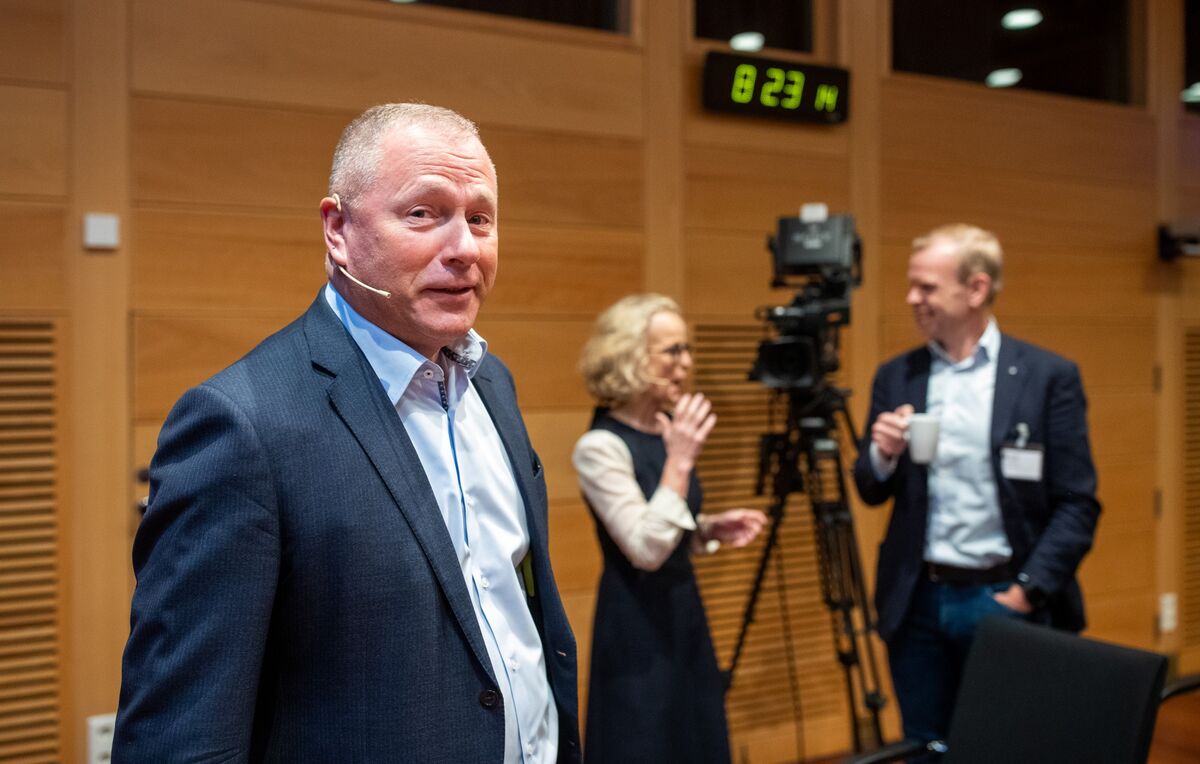How Norway's Top Investor, Nicolai Tangen, Navigated Trump's Trade Wars

Table of Contents
Nicolai Tangen, the highly successful CEO of Norges Bank Investment Management (NBIM), managing Norway's massive sovereign wealth fund, faced unprecedented challenges during Donald Trump's presidency. Trump's unpredictable trade wars created significant volatility in global markets, presenting a formidable test for even the most seasoned investors. This article explores how Tangen and NBIM navigated this turbulent period, offering valuable insights into their effective risk management strategies and investment decisions that can benefit any investor facing geopolitical uncertainty.
Understanding the Impact of Trump's Trade Wars on Global Investments
Trump's imposition of tariffs and his initiation of trade disputes with various countries sent shockwaves through global markets. The resulting uncertainty significantly impacted investment strategies worldwide.
Increased Market Volatility
The unpredictability of Trump's trade policies led to heightened market volatility.
- Increased price swings in various sectors: Sectors heavily reliant on international trade, such as manufacturing and agriculture, experienced dramatic price fluctuations as tariffs were imposed and retaliatory measures were enacted.
- Uncertainty impacting long-term investment planning: The lack of clarity regarding future trade policies made it challenging for investors to make long-term investment plans, forcing a shift towards shorter-term, more reactive strategies.
- Need for agile and responsive investment strategies: Investors needed to adopt agile strategies capable of adapting quickly to changing market conditions and responding to sudden shifts in global trade dynamics.
Sector-Specific Impacts
Specific sectors felt the brunt of Trump's trade wars disproportionately.
- Focus on sectors heavily reliant on international trade: Industries like technology, where supply chains often span multiple countries, were particularly vulnerable to disruptions caused by tariffs and trade restrictions.
- Analysis of winners and losers in the trade war landscape: While some domestic industries benefited from protectionist measures, many others suffered from decreased competitiveness and reduced access to foreign markets.
- Examples of companies significantly impacted by tariffs: Numerous companies, both large and small, experienced significant financial impacts due to increased costs associated with tariffs and trade barriers. These examples served as cautionary tales for investors about the importance of geopolitical risk assessment.
Nicolai Tangen's Strategic Responses to Trade War Uncertainty
NBIM, under Tangen's leadership, employed a multifaceted approach to navigating the challenges posed by Trump's trade wars.
Portfolio Diversification
NBIM's strategy focused heavily on diversifying its investment portfolio.
- Reducing exposure to heavily impacted sectors: NBIM likely reduced its exposure to sectors deemed particularly vulnerable to the trade wars, thereby limiting potential losses.
- Increasing investments in less volatile markets: The fund probably shifted some of its assets to less volatile markets and asset classes considered less sensitive to geopolitical risks.
- Emphasis on long-term growth potential despite short-term volatility: NBIM maintained a long-term investment horizon, prioritizing companies and assets with strong fundamental value and long-term growth potential, even amidst short-term market fluctuations.
Active Risk Management
NBIM implemented robust risk management procedures.
- Detailed risk assessment and scenario planning: The fund likely conducted detailed risk assessments and developed scenario planning models to anticipate and mitigate potential negative impacts from trade disputes.
- Enhanced monitoring of global economic indicators: NBIM closely monitored key economic indicators to quickly identify emerging risks and adjust its investment strategy accordingly.
- Strategic adjustments based on real-time market analysis: The fund’s investment decisions were driven by a rigorous process of real-time market analysis, allowing for prompt adjustments to changing conditions.
Emphasis on Sustainable Investing
NBIM's commitment to Environmental, Social, and Governance (ESG) investing likely played a role in its decision-making process.
- Alignment of ESG principles with risk management strategies: ESG considerations can help identify companies better equipped to navigate long-term challenges, thereby reducing risk exposure.
- Potential for long-term resilience within ESG investments: Companies with strong ESG profiles often demonstrate greater resilience to market disruptions and long-term financial stability.
- Balancing financial returns with sustainable development goals: NBIM likely aimed to balance financial returns with its commitment to sustainable development, suggesting a long-term view beyond immediate market volatility.
Lessons Learned from NBIM's Navigation of the Trade Wars
NBIM's experience during Trump's trade wars offers valuable lessons for all investors.
Adaptability and Agility
The ability to adapt to rapidly changing geopolitical landscapes is crucial.
- Importance of swift decision-making in volatile markets: Quick and informed decision-making is essential to navigate unpredictable market conditions.
- Capacity to adjust investment allocations based on new information: Investors need to be able to adapt their portfolio allocations in response to new information and market shifts.
- Need for continuous monitoring and reassessment: Ongoing monitoring of global events and economic indicators is crucial for proactive risk management.
Long-Term Perspective
Maintaining a long-term investment horizon is vital to weathering short-term market shocks.
- Focus on fundamental value rather than short-term price fluctuations: Investors should focus on the underlying value of assets rather than being swayed by short-term price volatility.
- Importance of patience and discipline in investment management: Patience and discipline are crucial to avoid making rash decisions during periods of market uncertainty.
- Resisting the urge to make panic-driven decisions: Investors should avoid making impulsive decisions based on fear or panic during volatile market conditions.
Conclusion:
Nicolai Tangen's leadership at NBIM during Trump's trade wars provides invaluable lessons for investors navigating an increasingly complex global landscape. By prioritizing portfolio diversification, active risk management, and a long-term investment perspective, NBIM successfully mitigated the negative impacts of this turbulent period. Understanding and adapting to geopolitical risks, such as those created by trade wars, is crucial for successful investing. Learn more about navigating global market volatility and developing robust investment strategies by further researching Nicolai Tangen's approach and the strategies employed by Norway's sovereign wealth fund. Mastering the art of navigating geopolitical risks is essential for long-term investment success.

Featured Posts
-
 The Monkey Sets A High Bar Will The 666 M Horror Franchise Reboot Deliver
May 04, 2025
The Monkey Sets A High Bar Will The 666 M Horror Franchise Reboot Deliver
May 04, 2025 -
 Martin Bakole Replaces Daniel Dubois Who Is Boxings Most Avoided Fighter
May 04, 2025
Martin Bakole Replaces Daniel Dubois Who Is Boxings Most Avoided Fighter
May 04, 2025 -
 Bradley Cooper And Gigi Hadid Avoiding Di Caprio Drama
May 04, 2025
Bradley Cooper And Gigi Hadid Avoiding Di Caprio Drama
May 04, 2025 -
 Met Department Issues Rain Warning For North Bengal Weather Update
May 04, 2025
Met Department Issues Rain Warning For North Bengal Weather Update
May 04, 2025 -
 Ford Remains Exclusive Automotive Partner Of The Kentucky Derby
May 04, 2025
Ford Remains Exclusive Automotive Partner Of The Kentucky Derby
May 04, 2025
